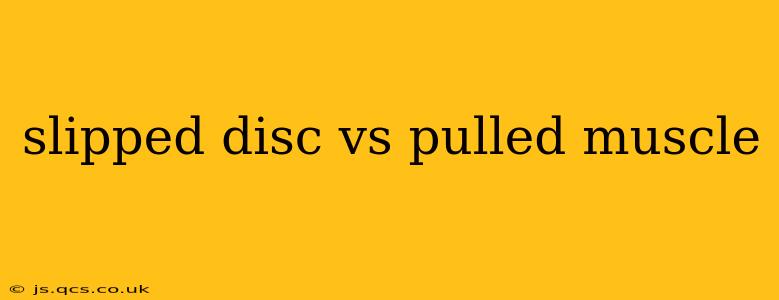Back pain is a common ailment, often leaving sufferers wondering about the underlying cause. Two frequently confused conditions are a slipped disc and a pulled muscle. While both can cause significant discomfort, they stem from different sources and require different approaches to treatment. This article will clarify the distinctions between a slipped disc and a pulled muscle, helping you understand your symptoms better.
What is a Slipped Disc?
A slipped disc, more accurately termed a herniated disc, occurs when the soft, gel-like center of an intervertebral disc pushes through a tear in the tougher outer layer. These discs act as cushions between the vertebrae in your spine. When a disc herniates, it can press on nearby nerves, causing pain, numbness, tingling, and weakness that may radiate down your arm or leg (sciatica, if in the lower back). The location of the herniated disc determines the specific symptoms experienced.
What causes a slipped disc?
Several factors contribute to slipped discs, including:
- Age: As we age, the discs naturally lose hydration and become less resilient.
- Degeneration: The gradual wearing down of the discs over time.
- Injury: Sudden trauma, like a fall or heavy lifting, can cause a disc to herniate.
- Repetitive stress: Repeated bending, twisting, or lifting can weaken the discs.
- Genetics: A family history of back problems may increase your risk.
What is a Pulled Muscle?
A pulled muscle, or muscle strain, involves an overstretching or tearing of muscle fibers. This typically occurs due to sudden movements or excessive exertion. The pain associated with a pulled muscle is usually localized to the affected muscle and is often described as sharp, aching, or throbbing. Unlike a slipped disc, a pulled muscle rarely causes numbness or tingling radiating down the limbs.
What causes a pulled muscle?
Pulled muscles are commonly caused by:
- Sudden movements: Quick, jerky motions can easily strain muscles.
- Overexertion: Pushing your muscles beyond their limits during exercise or physical activity.
- Poor posture: Maintaining poor posture weakens muscles and makes them more susceptible to injury.
- Lack of warm-up: Starting strenuous activity without proper warm-up increases the risk of muscle strain.
Slipped Disc vs. Pulled Muscle: Key Differences Summarized
| Feature | Slipped Disc | Pulled Muscle |
|---|---|---|
| Cause | Disc herniation | Muscle overstretching or tearing |
| Pain Location | Localized, may radiate down arm or leg | Localized to affected muscle |
| Other Symptoms | Numbness, tingling, weakness | Usually just pain |
| Severity | Can range from mild to severe, potentially requiring surgery | Usually less severe, often resolves on its own |
| Treatment | Rest, medication, physical therapy, possibly surgery | Rest, ice, heat, pain relievers, stretching |
How are slipped discs and pulled muscles diagnosed?
Diagnosis typically involves a physical examination and a review of your medical history. Imaging tests, such as X-rays, MRIs, or CT scans, may be used to confirm the diagnosis and rule out other conditions. For a slipped disc, an MRI is often the preferred imaging technique as it provides detailed images of the spinal structures.
What are the treatments for a slipped disc and pulled muscle?
Treatment for both conditions generally focuses on pain management and promoting healing. This may include:
- Rest: Avoiding activities that aggravate the pain.
- Over-the-counter pain relievers: Such as ibuprofen or acetaminophen.
- Physical therapy: Exercises to strengthen the back muscles and improve flexibility.
- Medication: In some cases, stronger pain medications or muscle relaxants may be prescribed.
- Surgery: In rare cases of severe slipped discs, surgery may be necessary to alleviate pressure on the nerves. This is not typically required for a pulled muscle.
Can a slipped disc cause a pulled muscle?
While not directly causing a muscle pull, a slipped disc can lead to muscle spasms and strain in the surrounding muscles as the body attempts to compensate for the pain and instability caused by the herniated disc.
When should I see a doctor?
It's crucial to seek medical attention if you experience:
- Severe pain that doesn't improve with rest or over-the-counter medications.
- Numbness, tingling, or weakness radiating down your arm or leg.
- Loss of bowel or bladder control.
- Progressive weakness in your legs or arms.
This information is for general knowledge and does not constitute medical advice. Always consult with a healthcare professional for diagnosis and treatment of any medical condition.
